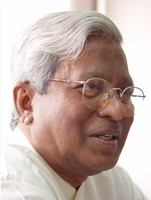BRAC

Credit: Image released BRAC's public relations department under CC-Attribution.
Licence: Creative Commons Attribution 2.5 Generic
Unknown
| Giver: | Registered Organization |
|---|---|
| Receiver: | Registered Organization |
| Gift: | Money |
| Approach: | Philanthropy |
| Issues: | 10. Reduced Inequalities, 11. Sustainable Cities and Communities |
| Included in: | Humanitarianism & Philanthropy, International Development, Volunteerism |
BRAC (Building Resources Across Communities) is a global NGO committed to helping people raise themselves out of material poverty. Launched by business executive Fazle Hasan Abed in 1972, BRAC originally served as a relief operation to aid Bangladeshis impacted by the struggle for independence from Pakistan. Over time, Abed expanded the reach of his mission to encompass maternal and child health initiatives, microlending services, educational institutions and other programs.
Abed’s philosophy of giving was rooted in a core faith in people, particularly women and children. Investing in human capital, Abed believed, can cultivate mutual assistance within entire communities — an approach to generosity that is empowering, liberating and self-sustaining.
Abed was born in Bengal Province, British India, in 1936. As a child he survived the Bengal famine of 1943, a disaster that left three million dead. Four years later, he witnessed the Partition of India, a violent rupture that claimed millions more lives. A new homeland, East Bengal (later East Pakistan), arose out of the conflict.
After graduating from the Chartered Institute of Management Accountants in London, Abed returned to East Pakistan to serve as Head of Finance for Shell Oil. In 1970, when the Bhola Cyclone killed between 300,000 and 500,000 of his fellow citizens, Abed volunteered for the relief effort. Coming face to face with the devastation, he began to question his corporate career path.
The outbreak of the Bangladesh Liberation War in 1971 forced Abed to flee the country. From exile in London he launched the pro-independence initiatives HELP Bangladesh and ACTION Bangladesh. Returning to Bangladesh in 1972, he resigned from Shell to create the Bangladesh Rehabilitation Assistance Committee.
In the beginning BRAC provided material assistance to help communities rebuild after the war, donating seeds and tools to farmers, overseeing the construction of new housing and offering basic medical care. In 1974, as his mission expanded in scope, Abed renamed the organization the Bangladesh Rural Advancement Committee.
In order to have a more lasting impact, BRAC set out to strengthen Bangladesh’s rural economy through a microfinancing program. The organization lent small sums to enable farmers to buy cows and chickens, reinvesting proceeds from the sale of milk and eggs into the villages. Soon, a thriving network of agricultural cooperatives emerged. BRAC continued to expand its range of initiatives, with efforts to combat disease, establish schools and develop maternal care services.
With the overthrow of the Taliban by U.S.-led coalition forces in 2002, BRAC established relief operations in Afghanistan. In the decades that followed, the organization expanded its presence into other areas of Asia and Africa.
Fazle Hasan Abed died in 2019, but his legacy survives. BRAC (now Building Resources Across Communities) is one of the largest NGOs in the world, operating in eleven countries and working with over a hundred million people. The organization has sponsored nearly 400,000 development projects, all directly managed by the communities they serve. Through its ongoing commitment to supporting and empowering people, BRAC continues to demonstrate the transformative power of Abed’s ideals.
Contributors: Maha Tazi, Stephen Meyer
| Source type | Full citation | Link (DOI or URL) |
|---|---|---|
| Publication |
Inayatullah, Sohail Tahir; Ahmed, Shakil; Alam, Pushpita; Davis, Susan; Hashemi, Syed. “Alternative Scenarios for BRAC University,” On the Horizon, Vol 21, 2013. |
ISSN: 1074-8121 |
| Publication |
Khan, Afreen. Employee Engagement Programs Designed by Aarong for Different Levels of Employees, BRAC University Institutional Repository, 2014. |
https://dspace.bracu.ac.bd/xmlui/handle/10361/3608 |
| Private Communication |
Kundu, Ajit Kumar. Internship Report on Public Private Mix Approach in Tuberculosis Control Programme, BRAC, BRAC Institute of Governance and Development, BRAC University, 2016. |
https://bit.ly/41i8EOi |
| Publication |
Kayser, Olivier;Budinich, Valeria. “Scaling up Business Solutions in Social Problems,” In Social entrepreneurs = size or influence?, Palgrave Macmillan, 2015. |
ISBN: 978-1-137-46654-9 |
| Publication |
Abdullah, Naziruddin. “The Effectiveness of Micro-Finance Institutions in Alleviating Poverty: The Case of Bangladesh’s Grameen Bank and BRAC,” Journal of Social and Development Sciences, 2013: 339-348 |
http://bit.ly/3xKzi4C |